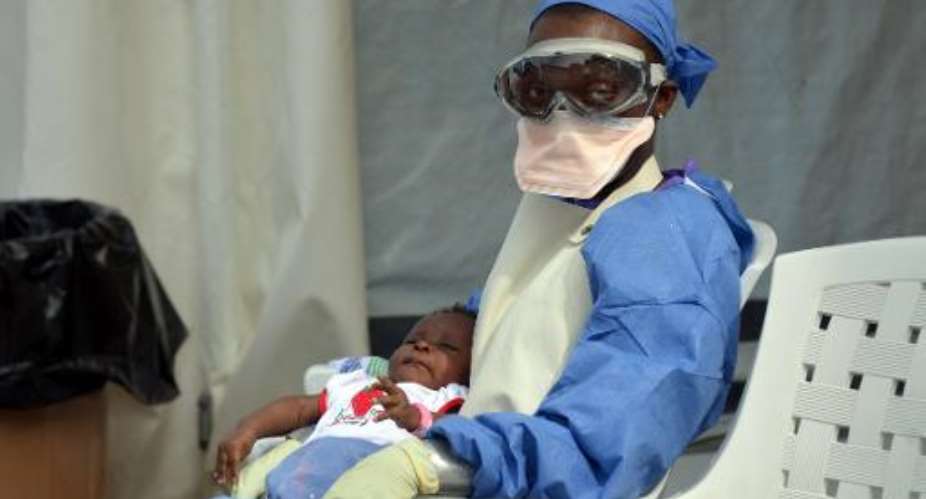Brussels (AFP) - European foreign ministers will meet on Monday under pressure to scale up their response to the Ebola epidemic after warnings it could become the "disaster of our generation".
Ahead of the talks, aid agency Oxfam, which works in the two worst-hit countries -- Liberia and Sierra Leone -- issued a stark call for more troops, funding and medical staff to be sent to the west African epicentre of the outbreak.
The president of Liberia also made an impassioned appeal to the world's nations to pitch in, saying the "time for talking or theorising is over."
"This fight requires a commitment from every nation that has the capacity to help -- whether that is with emergency funds, medical supplies or clinical expertise," Nobel laureate Ellen Johnson Sirleaf said in an open letter to the BBC.
"From governments to international organisations, financial institutions to NGOs, politicians to ordinary people on the street in any corner of the world, we all have a stake in the battle against Ebola."
The worst-ever outbreak of the deadly virus has so far killed more than 4,500 people, almost all in west Africa, but isolated cases have now begun to appear in Europe and the United States.
Liberia is the worst-hit of all, with 4,262 cases and 2,484 deaths as of October 13.
"There is a very strong political focus on this as the most immediate crisis facing us," a European diplomat said ahead of the meeting in Luxembourg.
Another EU diplomat said Britain -- which has a navy ship bound for Sierra Leone laden with medical staff and supplies -- hoped to "galvanise EU action on Ebola".
"There is a real sense that this is a tipping point and we must get to grips with it now," said the diplomat. "If we can deal with it in the country, we don't have to deal with it at home."
- Evacuation flights -
According to a European diplomat, there are plans for three nations to spearhead global assistance to the worst-hit countries -- the United States for Liberia, Britain for Sierra Leone and France for Guinea.
The 28 European foreign ministers will take stock of all means available for fighting Ebola, which Oxfam warned "could become the definitive humanitarian disaster of our generation".
Europe is under pressure to free up funds, but especially to send skilled staff to Africa.
Part of the solution, EU diplomats said, was giving international medics -- on the Ebola frontline -- the confidence they would receive Western-level care if they get sick, with access to medical evacuation flights.
The World Bank has warned the battle is being lost against the disease, which spreads via contact with bodily fluids and for which there is no licensed treatment or vaccine.
A global UN appeal for nearly $1 billion (785 billion euros) has so far fallen short, although more money is coming in daily.
Out of $988 million requested a month ago, the UN said Saturday $385.9 million had been given by a slew of governments and agencies, with a further $225.8 million promised.
- Spooked public -
With panic spreading in Western countries fearing a spread of the tropical disease, US President Barack Obama named an "Ebola czar" to coordinate crisis response.
Obama also cautioned against "hysteria" after a string of Ebola false alarms among a US public spooked by the news that two American nurses had contracted Ebola after treating a Liberian patient who died on October 8.
"This is a serious disease, but we can't give in to hysteria or fear," Obama said.
At the Pentagon on Friday, an entrance was closed after a woman vomited in a parking lot. US authorities later found no evidence that she had contracted Ebola.
Meanwhile, US media reported on overzealous action taken by some worried communities, including a group of Mississippi parents who pulled their children from school because the principal had travelled to Zambia -- a southern African country far from the Ebola crisis in west Africa.
The United States, Britain and Canada were joined this weekend by France in screening air passengers from Ebola-hit zones. The EU is to further review the situation this week.
Obama has played down the idea of a travel ban from west Africa, as World Bank chief Jim Yong Kim criticised countries for being overly focused on securing their own borders, rather than helping tackle the epidemic at source.
As of October 14, 4,555 people had died from Ebola out of a total of 9,216 cases registered in seven countries, the World Health Organization said.
burs-ec/txw





 We’ll no longer tolerate your empty, unwarranted attacks – TUC blasts Prof Adei
We’ll no longer tolerate your empty, unwarranted attacks – TUC blasts Prof Adei
 Bawumia donates GHc200,000 to support Madina fire victims
Bawumia donates GHc200,000 to support Madina fire victims
 IMF to disburse US$360million third tranche to Ghana without creditors MoU
IMF to disburse US$360million third tranche to Ghana without creditors MoU
 Truck owner share insights into train collision incident
Truck owner share insights into train collision incident
 Paramount chief of Bassare Traditional Area passes on
Paramount chief of Bassare Traditional Area passes on
 Two teachers in court over alleged illegal possession of BECE papers
Two teachers in court over alleged illegal possession of BECE papers
 Sunyani: Victim allegedly shot by traditional warriors appeals for justice
Sunyani: Victim allegedly shot by traditional warriors appeals for justice
 Mahama vows to scrap teacher licensure exams, review Free SHS policy
Mahama vows to scrap teacher licensure exams, review Free SHS policy
 Government will replace burnt Madina shops with a new three-story, 120-store fac...
Government will replace burnt Madina shops with a new three-story, 120-store fac...
